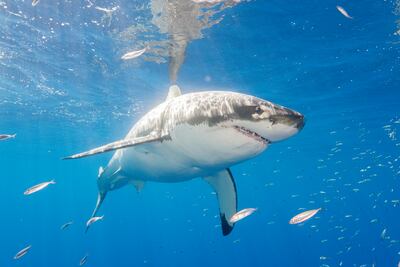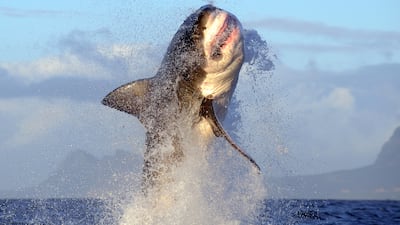Great white sharks could soon be found in UK waters, according to researchers from the US, who plan to visit Cornwall to search for them.
The world’s largest predatory fish is found in many locations globally, such as in the seas off South Africa, where water temperatures are similar to those in the UK.
There has not yet been a confirmed sighting in Britain.
But the US-based Ocearch believes that could soon change as the sharks migrate north from the Mediterranean searching for seals.
“We believe they should be moving up past Brest [in Brittany] and Cornwall,” Chris Fischer, founder of Ocearch told The Times. He said researchers will visit the area next summer to search for them.
The theory is based on the fact that other fish populations the group has studied have moved north in search of food.
Cape Cod is now home to a large population of great whites, which researchers believe is because environmental protections have led to an increase in the numbers of seals in the area.
According to the University of Plymouth, it has always been something of a mystery why great whites are not found in the UK’s seas.
“Sharks, especially great whites, eat a lot of seals as part of their diet and there are more than 43,000 harbour seals and 90,000 grey seals in the UK,” it said.
“Being among the only warm-blooded fish, great whites get most of their energy from their food and one of the best sources of energy comes from fat – and seals have a lot of that – which makes the UK a tempting hunting ground.”
Experts say great whites are able to live in waters that range in temperature anywhere between 2.7°C and 27°C.
However, the waters they tend to live in are generally about 16°C, “which is bang in the middle of the mean water temperature the UK experiences during summer and autumn months”, the university said.
The reasons why they are not routinely found here are not fully understood.
There have been sightings in the UK – more than 100 of which are considered credible by the Shark Trust over the past decade. But none have been confirmed.
One theory why they are not here, or at least not spotted, was put forward by a marine biology student at Plymouth, who said British waters display “near perfect habitat suitability for both sexes year round”, demonstrating that there is no environmental reason for their apparent absence.
He said behavioural studies suggest if a great white was to visit the UK’s waters it would most likely be a male from the Mediterranean population “swimming at depth”, which would explain why they are not seen.

But it may also be because Mediterranean sharks “have different environmental preferences due to their geographic isolation and potential speciation”.
The Mediterranean area is known to be home to a population of great whites, and they have probably been there for a “very long time”, according to an article in National Geographic.
A study co-ordinated by Virginia Tech’s Prof Francesco Ferretti in 2020 found that their numbers have declined rapidly and are now at high risk of being “completely eradicated” from the region.


